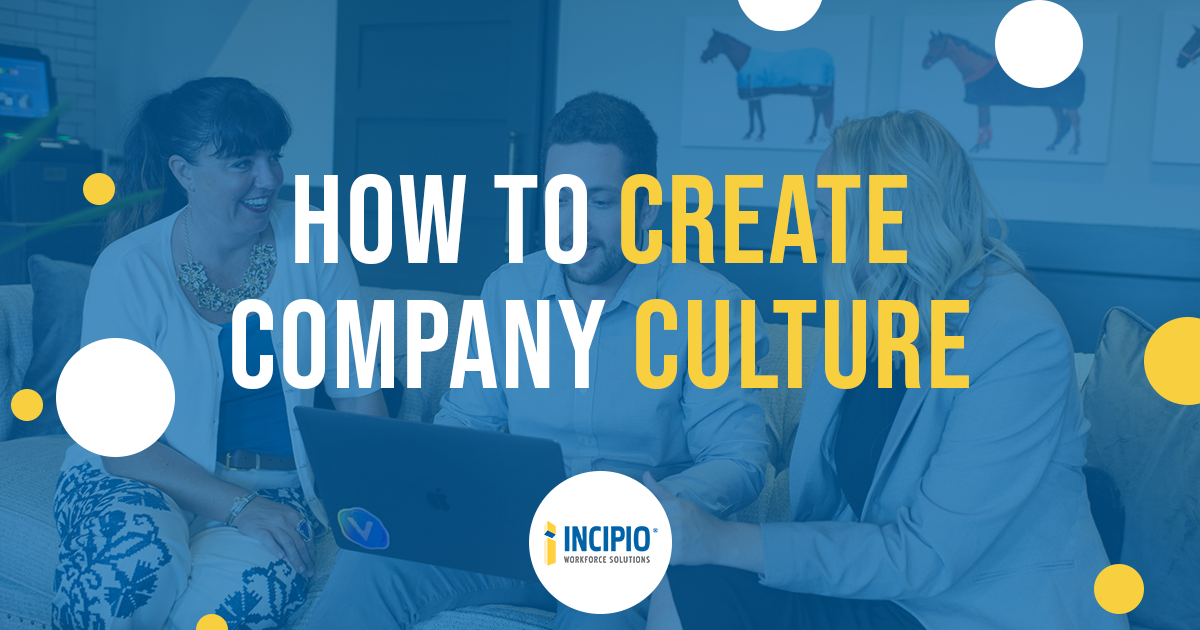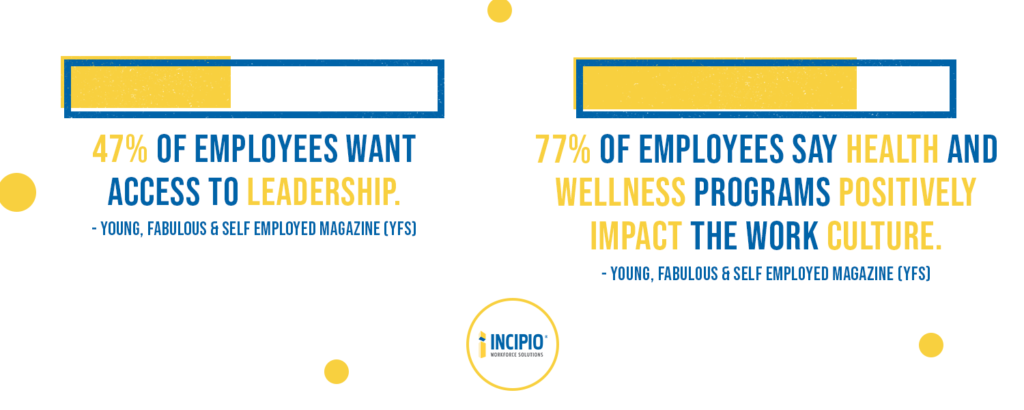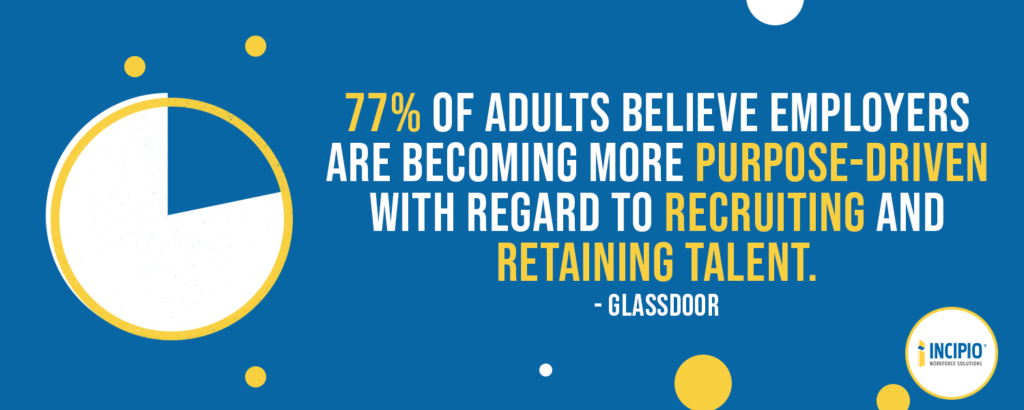How To Create Company Culture
incipioworkstg
on
November 15, 2021

It is the little things, done consistently, that earn employers a reputation for being employee-centric. It is those little things that provide a sneak peek into the culture that a company is establishing for themselves and their team. Whether you’re a small business or a large organization hearing the words company culture can sometimes seem daunting, but that does not necessarily need to be the case.
Company culture is a term that has increasingly come to the forefront when discussing employment, recruiting, retention, and human resources. Company culture defines the environment in which employees work and highlights a company’s values, expectations, and behaviors. For some organizations, a company’s culture may have been deliberately cultivated or could also be the result of the accumulation of decisions that have been made over time by company leaders. Either way, the importance of company culture is becoming more and more relevant.
Some may ask why is company culture so important? There are a number of reasons why but for starters, it can lead to higher productivity, elevated level of employee engagement, boost in employee morale, increased innovation and creativity, and of course lower turnover to list a few.

In a survey conducted by Glassdoor, it was found that over half of job applicants indicated that company culture is more important than salary when looking at job satisfaction. The same survey also found that over 77% of adults in the United States, UK, France & Germany would consider a company’s culture before applying for a job.
Although there is no right or wrong when sitting down to evaluate your current company culture or begin to establish one, there are several areas that you will want to look at.
Purpose: an organization’s purpose is bigger than the product or services that it provides. A company’s purpose is the backbone of the company, outlining who they are and why they exist. It is important that the purpose is in line with an organization’s values and goals. Glassdoor’s survey indicates that nearly nine in ten adults believe that it is important to have a clear mission and purpose. Their report also noted that 77% of adults believe employers are becoming more purpose-driven with regard to recruiting and retaining talent. Thus confirming that this employee-centric world is becoming more mainstream.

Leadership: According to Young, Fabulous & Self Employed Magazine (YFS), 47% of employees want access to leadership. Employees want to be a part of a team that trusts them to work independently and not be micromanaged. Employees also crave someone that can guide and mentor them in their careers. Encouraging and building workplace relationships with team members is seen as gold. In addition, employees want to feel heard. Providing opportunities for employees to share and receive feedback outside of employee evaluations is vital to creating a welcoming team environment. Creating opportunities for lower-level employees to interact with upper management during the workday as well as in social situations is highly encouraged.
Appreciation: Employees look for their efforts to be recognized, whether through upward mobility or simple exchanges between their department or team. Employees want to feel valued for not just their hard work, but the overall package that they bring to the table. Gratitude and encouragement go a long way in any situation, but it is something that can elevate your team to imaginable heights. Offering simple amenities like dress-down Fridays and social events can go a long way to show your team how you appreciate them. Creating programs for employee recognition are also ways to show appreciation. Celebrating milestones, birthdays, company anniversaries, or surpassing company goals. Highlighting a team member on your social media or company newsletter costs nothing but will make that employee feel important and special, creating a positive work environment and can in fact be seen in your bottom line numbers.
Wellbeing: It is essential that your employees feel that your organization places a priority on work-life balance, providing flexibility with hours, remote working options, and establishing healthy relationships between co-workers. For some company’s it may mean to include health and wellness benefits to their team. Investing in employee wellbeing will lead to increased employee engagement and a lower retention rate. YSF found that 77% of employees say health and wellness programs positively impact the work culture. Simple things like allowing dogs at the office, allowing employees to listen to music, and offering opportunities to break bread together can increase employee engagement and productivity. Some employers are also providing benefits such as on-property fitness centers, virtual yoga classes, company-sponsored book clubs, and special interest clubs or activities like cooking, physical activities, healthy living, and more.

Opportunity: Opportunity can mean different things to different people. Understanding this is important as one person may be motivated by compensation, another may be motivated by the opportunity to work remotely, and another by the upward mobility of an organization that promotes from within. Each employee brings something unique to your team and their wants and desires for their career are just as unique. Really getting to know your employees on a personal level and sitting down to assess their career aspirations, and noting what their short and long-term goals are is essential to designing a path for them at your organization. Sharing the company’s short and long-term goals is also a part of this equation. It shows your employees that you are thinking about them long-term. Follow-through is vital in all of these areas in order for them to be effective.
Success: How is success defined in your organization? Are you a results-driven organization that is highly competitive or are you a more customer service-based organization that allows for a more laid-back feel? Neither is better than the other, but it can dictate the types of candidates that will seek employment with you. It can also help determine which employees will thrive and which will seek out other opportunities. Is your organization one that promotes innovation and creativity with an open door policy? Are you consistent with how you define success? Are the rules the same for administrative employees and sales employees? Communicating how your company defines success is important from the interview process through to long-term employees.

The bottom line, company culture is key to the success of any company. Employees are more likely to enjoy their work when their needs and values are consistent with their employers. When employees are happy with their place of employment they tend to be more productive and motivated to not only meet the goals of the company but to exceed them. Maybe it is time to reevaluate your company culture by drilling down on the above areas. This will not only have a positive effect on your current team but will assist with recruiting future candidates.
Incipio can assist you with creating a work culture that revolves around recognition, appreciation, synergy amongst team members, a balance of equality and fairness while looking at all of the above and how it relates to your organization.
Incipio Workforce Solutions is a strategic partner in helping businesses thrive through recruiting, HR solutions, direct hire recruiting, employer branding, team building, and more! Since 2015, Incipio has been on a mission to transform the way companies attract, engage, and delight their team members. Our professional services break down the challenges you face and create manageable goals, obtainable standards, and process improvements to reorganize, revitalize, and redefine what was into what is possible. Comprised of expertise in HR, Recruiting, Employer Branding, and Service, Incipio gives companies the tools they need to successfully manage their employee experience from interview to retirement. For more information on how we can help you and your business, call us at 502-409-4821 or email us at [email protected]

